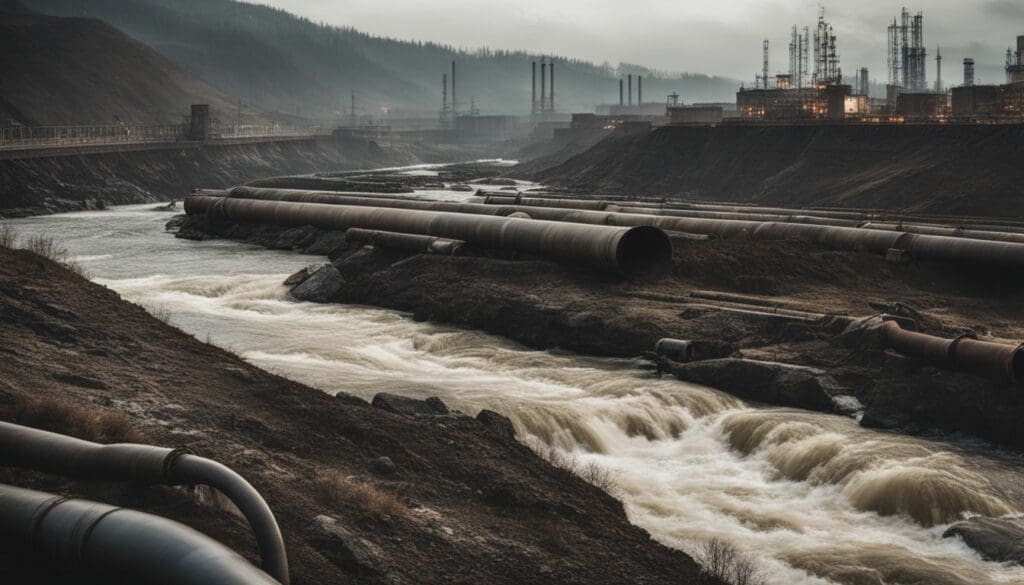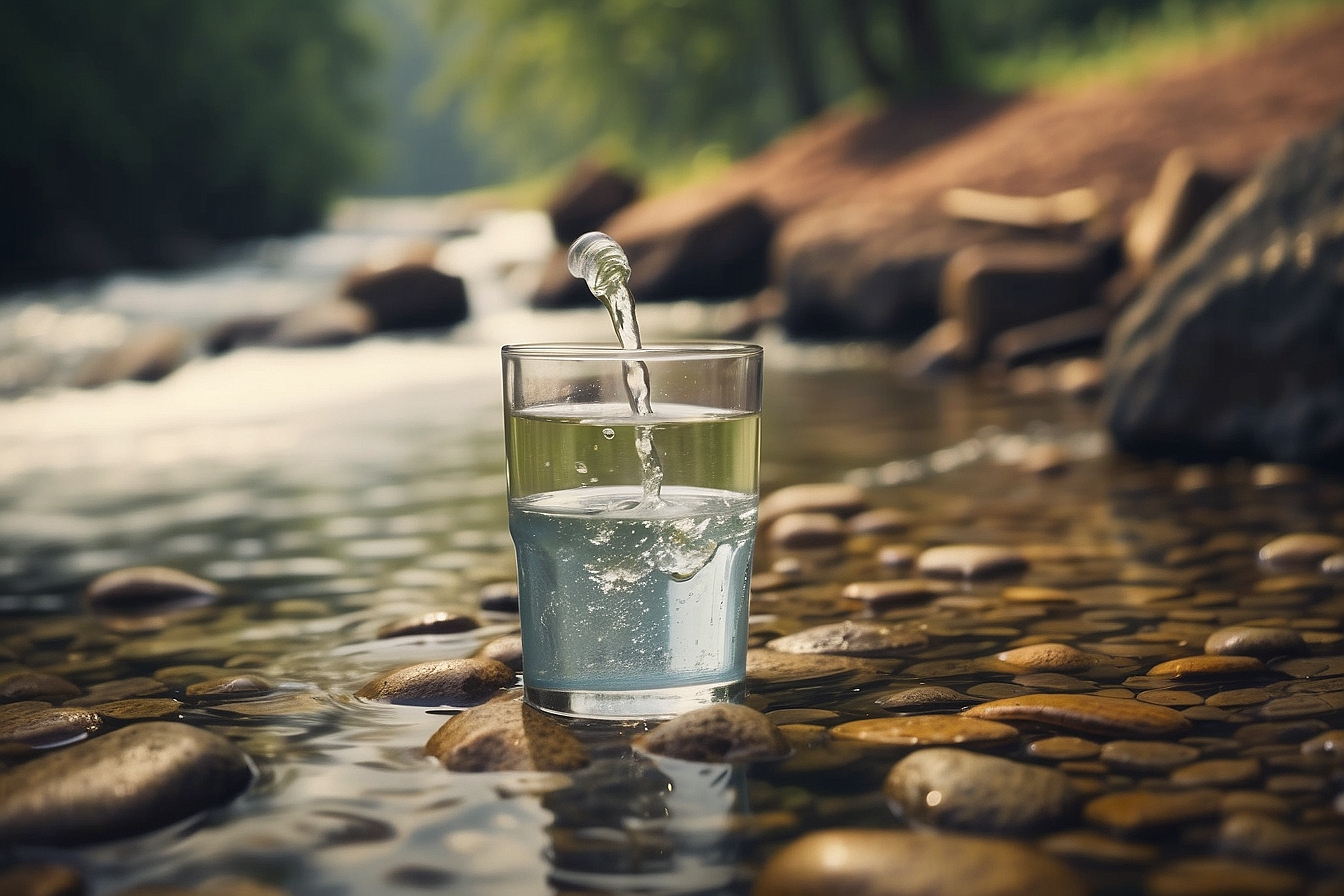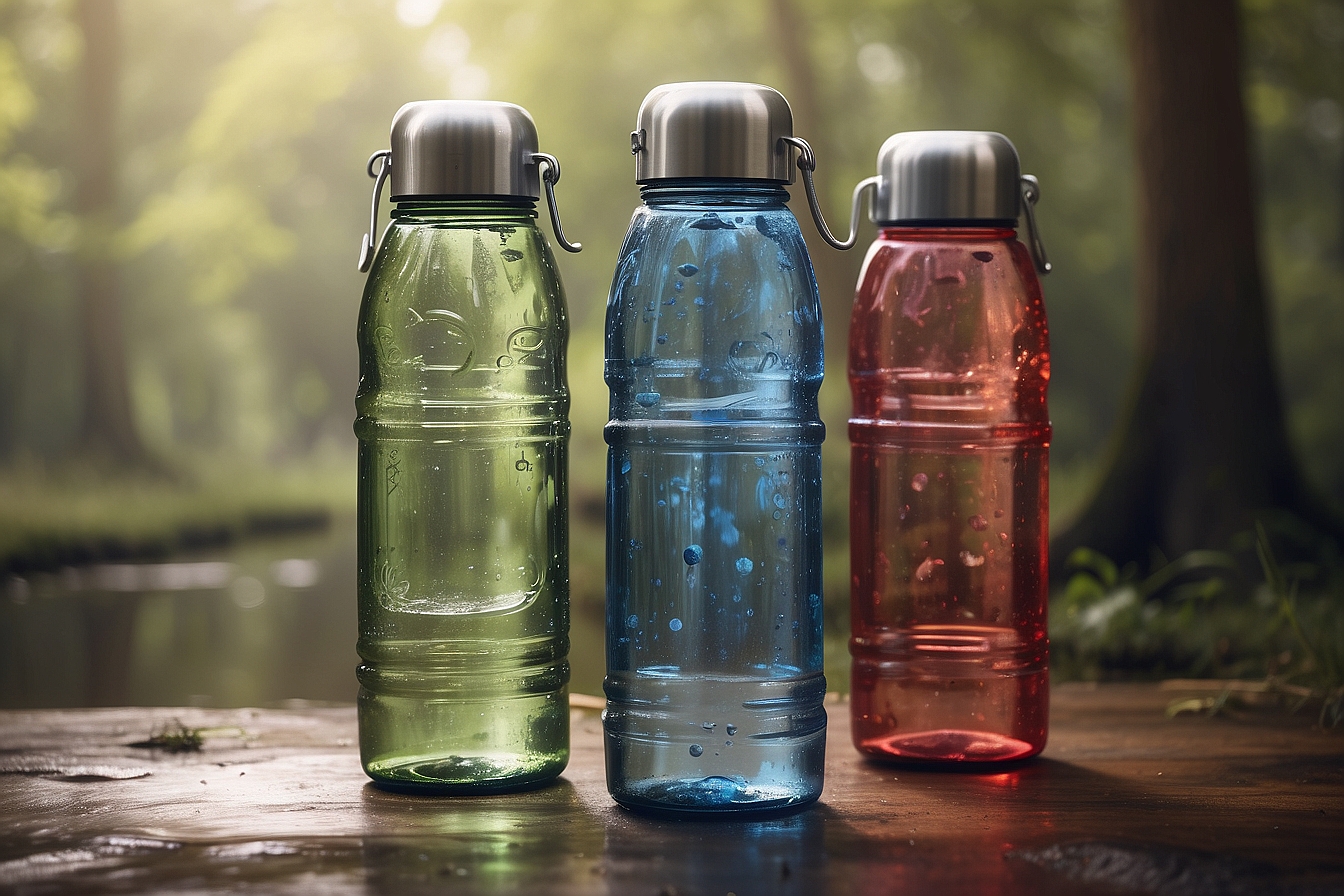The plight of our rivers is undeniable, suffocated under the unyielding torrent of industrial waste that imperils not just the delicate balance of nature but also the well-being of communities far and wide.
Many amongst us have observed these trials from a painful proximity, spurring us to delve into extensive research in search of viable remedies. This article aims to shine a light on the most promising strategies for alleviating the burden of industrial pollutants on our cherished watercourses.
Brace yourselves for an inspiring glimpse into a cleaner and more hopeful future!
Key Takeaways
- Industrial activities release harmful substances such as toxic chemicals and heavy metals into rivers, critically affecting aquatic life and human health. Sectors like chemical plants, textile factories, metal manufacturing, and agriculture contribute significantly to this pollution.
- Managing industrial effluents is essential for environmental sustainability and public well-being. Pilot water treatment plants and advanced technologies like nanotechnology are being developed to treat wastewater effectively.
- Natural methods such as phytoremediation use plants to remove pollutants from water in an eco-friendly way. This promotes healthier ecosystems while also offering a cost-effective solution compared to traditional treatments.
- To achieve cleaner waterways, it is imperative that industries comply with legal requirements for waste management. Collaboration between government bodies, industries, and communities can lead to innovative solutions that ensure the protection of our natural resources.
- Public education on the importance of clean rivers is vital. Encouraging community involvement in conservation efforts can help maintain the health of water bodies for current and future generations.
Industrial Activities and their Impact on Water Pollution
Industrial activities such as manufacturing, mining, and chemical production are major contributors to water pollution. These industries discharge toxic chemicals, heavy metals, and other harmful substances into rivers and water bodies, leading to devastating effects on aquatic life and human health.
Types of industries responsible for water pollution
- Chemical plants lead the list, discharging hazardous substances like acids, bases, solvents, and heavy metals.
- Textile factories contribute significantly by pouring dyes and bleaches that disrupt aquatic ecosystems.
- Metal manufacturing operations introduce dangerous lead and mercury into nearby waters.
- Pulp and paper mills emit organic compounds that deplete oxygen levels, harming fish and other marine life.
- Food processing facilities often release high levels of organic waste which can increase nutrient concentrations leading to algal blooms.
- Pharmaceutical companies may inadvertently allow residues of drugs to enter water systems, posing unknown risks to wildlife.
- Oil refineries process crude oil, releasing harmful hydrocarbons and other toxic pollutants into rivers.
- Agricultural runoff, though not an industry per se, includes pesticides and fertilisers from farms that contaminate surface water.
Effects on aquatic life
Industrial effluents have detrimental effects on aquatic life, leading to reduced oxygen levels in water bodies and harming fish, invertebrates, and other organisms. Chemical pollutants such as heavy metals, pesticides, and toxic organic compounds disrupt the balance of ecosystems by affecting reproduction, growth, and behaviour of aquatic species.
These pollutants accumulate in the tissues of fish and other aquatic organisms which can be transferred up the food chain. Additionally, changes in water temperature caused by industrial discharges can also impact the breeding patterns of fish and alter their natural habitats.
These factors combined pose a severe threat to marine biodiversity and contribute to the degradation of our waterways.
Human health implications
Industrial effluents not only impact aquatic life but also pose significant risks to human health. Contaminated water from industrial waste can introduce harmful chemicals and toxins into the environment, which may enter the food chain and affect human consumption.
Exposure to such pollutants has been linked to various health issues, including respiratory problems, skin irritation, and even long-term illnesses like cancer. Additionally, consuming water contaminated with industrial effluents can lead to gastrointestinal problems and other serious medical conditions in affected communities.
Furthermore, prolonged exposure to polluted water sources can have detrimental effects on public health, emphasising the urgent need for effective measures to reduce industrial pollution and safeguard human well-being.
Need for Reducing Water Pollution
Industrial activities contribute significantly to water pollution, leading to severe environmental and economic consequences. As a result, there is an urgent need to reduce water pollution through effective waste management and sustainable practices.
These efforts are crucial for safeguarding our natural resources and ensuring the well-being of both aquatic life and human health.
Environmental consequences
Industrial activities have severe environmental consequences, notably water pollution. Industrial effluents contribute to the degradation of rivers and other water bodies, disturbing aquatic ecosystems.
The discharge of untreated wastewater from industries leads to high levels of toxic chemicals and heavy metals in water, harming plant and animal life that rely on these habitats for survival.
Furthermore, excessive nutrient loads from industrial sources can lead to algal blooms, reducing oxygen levels in the water and causing harm to fish populations.
As environmentally conscious individuals supporting conservation efforts, it is crucial that we address the environmental consequences of industrial pollution. By understanding the impacts on aquatic life and human health implications caused by industrial effluents, we can work towards more sustainable solutions for waste management and prevention strategies.
Economic impacts
Reducing industrial effluents has significant economic impacts. By implementing sustainable water management practices, industries can minimise waste and reduce the costs associated with environmental contamination.
Sustainable wastewater solutions not only help in complying with environmental regulations but also prevent financial losses due to pollution control measures. Implementing eco-friendly approaches for industrial waste management reduces the need for expensive cleanup operations and liability claims.
Efficient waste minimisation and segregation coupled with the use of advanced technologies contribute to saving resources, cutting down on production costs, and creating a more sustainable business model.
Moreover, investing in wastewater recycling systems can lead to long-term cost savings by reusing water resources efficiently and mitigating the economic burden of excessive water consumption.
Legal requirements
Industrial activities must comply with strict legal requirements to prevent water pollution. These regulations ensure that effluent discharge is within permissible limits, preventing harm to aquatic life and human health.
Compliance with these laws also helps in maintaining the ecological balance of our water ecosystems and protects valuable natural resources.
Effluent discharge regulations are a vital aspect of controlling industrial pollution. They require thorough waste segregation, surface water monitoring, and effective environmental pollution control measures.
Meeting these legal obligations not only safeguards the environment but also upholds our commitment to sustainable water management practices.
Methods for Reducing Industrial Effluents
Implementing pilot water treatment plants, utilising advanced technologies, and adopting sustainable approaches are crucial steps in reducing industrial effluents. Read more about these effective methods for combating water pollution caused by industrial activities.
Pilot water treatment plants
Pilot water treatment plants are crucial in testing and refining new methods to efficiently treat industrial effluents. These small-scale facilities enable us to evaluate the effectiveness of different treatment processes and technologies before full implementation, ensuring that we invest in solutions with proven results.
By embracing innovation through pilot plants, we can develop eco-friendly approaches that minimise environmental impact while effectively managing industrial waste discharge. This proactive strategy aids in loss prevention by identifying and rectifying potential issues before they become widespread problems, ultimately contributing to water pollution prevention.
Furthermore, implementing these initiatives aligns with our commitment to continuously improve industrial pollution control measures. The knowledge gained from pilot initiatives can inform advancements in effluent management strategies and enhance overall water treatment practices for a more sustainable future.
Advanced technologies
After piloting water treatment plants, more advanced technologies are being developed to combat industrial effluents. These innovative methods include nanotechnology, electrocoagulation, and membrane filtration systems.
Nanotechnology involves the use of nanoparticles to trap and remove contaminants from wastewater, while electrocoagulation employs electrical currents to destabilise pollutants for easier removal.
Additionally, membrane filtration systems use semi-permeable membranes to separate impurities from water, ensuring a more effective purification process.
Furthermore, the integration of artificial intelligence in monitoring and optimising treatment processes has shown promising results in enhancing efficiency and reducing energy consumption.
Sustainable approaches
Transitioning from advanced technologies, we also emphasise the importance of sustainable approaches in combating industrial effluents. Implementing eco-friendly methods for managing and treating water pollution is essential.
These approaches take into account long-term environmental impacts and aim to minimise harm to ecosystems, utilising natural solutions and environmentally friendly practices such as phytoremediation to promote cleaner waterways and protect aquatic life.
Phytoremediation: A Natural Solution
Phytoremediation is an eco-friendly and natural approach to treating industrial effluents using plants. It offers numerous benefits for water treatment and is a sustainable solution for combating river pollution.
How it works
- Plants are selected based on their ability to accumulate specific pollutants in their tissues.
- As contaminated water flows through the plant’s root system, pollutants are absorbed and filtered out.
- Once absorbed, some pollutants are broken down by enzymes within the plant, rendering them less harmful.
- The cleaned water is then released back into the environment, promoting healthier aquatic ecosystems.
- Phytoremediation offers a sustainable and cost – effective method for mitigating industrial effluents’ impact on water quality.
Benefits of using plants for water treatment
Using plants for water treatment offers numerous benefits. Firstly, it is a natural and eco-friendly approach, avoiding the need for harsh chemicals. Secondly, this method helps to improve water quality by removing pollutants such as heavy metals, organic compounds, and nutrients.
Additionally, plants contribute to the beautification of water bodies and enhance biodiversity in aquatic ecosystems. Furthermore, plant-based water treatment systems are cost-effective compared to traditional methods since they require lower operational and maintenance expenses.
Also, utilising plants for water treatment supports sustainable practices and contributes to overall environmental conservation efforts. This approach aids in reducing carbon footprint while promoting healthier aquatic habitats for various species of wildlife.
Conclusion and Future Perspectives
In conclusion, it is vital to address industrial effluents in order to protect our waterways and the ecosystems they support. Collaborative efforts between industries, government agencies, and environmental organisations are necessary for a sustainable future with cleaner water sources.
Importance of addressing industrial effluents
Addressing industrial effluents is crucial for safeguarding our waterways and preserving the health of aquatic ecosystems. By reducing the discharge of harmful chemicals, heavy metals, and other pollutants from industrial activities, we can prevent further degradation of our rivers and lakes.
This initiative not only protects wildlife but also ensures the safety of drinking water sources for human communities living downstream. Implementing eco-friendly approaches to manage industrial effluents is essential for maintaining a sustainable balance between economic development and environmental conservation.
Taking proactive measures to address industrial effluents significantly contributes to improving water quality, supporting biodiversity, and promoting public health. Encouraging industries to adopt responsible waste management practices empowers us in our joint efforts towards cleaner waterways and a healthier planet overall.
Collaborative efforts for cleaner waterways
To achieve cleaner waterways, collaborative efforts among governments, industries, and communities are crucial. Implementing stricter regulations on industrial waste discharge is essential to minimise the pollution caused by effluents.
Additionally, fostering partnerships between environmental agencies and businesses can lead to innovative solutions for sustainable industrial practices. By working together to enforce responsible waste management and investing in eco-friendly technologies, we can significantly reduce the impact of industrial activities on our water resources.
Furthermore, educating the public about the importance of preserving clean waterways through community initiatives and awareness campaigns is vital. Encouraging active participation from individuals in local clean-up programmes and conservation projects will contribute to the ongoing protection of our natural water bodies.
FAQs
1. What is river pollution from industrial effluents?
River pollution from industrial effluents occurs when waste liquids released by factories and industries flow into rivers, harming the water quality and environment.
2. How can we control water pollution caused by industrial effluents?
We can control water pollution through ecofriendly approaches like treating waste before releasing it, using less harmful materials, and following strict regulations to reduce environmental impact.
3. Why is it important to combat the environmental impact of industrial effluents?
Combating the environmental impact of industrial effluents is vital for protecting wildlife, keeping our rivers clean for future generations, and ensuring a healthy ecosystem.
4. Are there ecofriendly ways to handle industrial waste that won’t pollute rivers?
Yes, industries can adopt environmentally friendly methods such as recycling wastewater or using cleaner production techniques to decrease the chances of river pollution.





